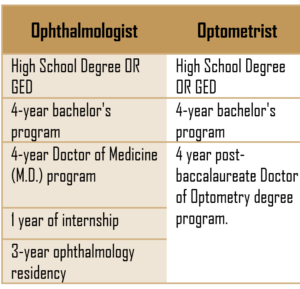
Understand eye care doctor types and when to see who. It is important you know these differences for healthy eyes in Idaho Falls.
Ophthalmologist
An ophthalmologist is a medical or osteopathic doctor who specializes in eye and vision care. Ophthalmologists differ from optometrists and opticians in their levels of training and in what they can diagnose and treat. As a medical doctor who has completed college and at least eight years of additional medical training, an ophthalmologist is licensed to practice medicine and surgery. An ophthalmologist diagnoses and treats all eye diseases, performs eye surgery and prescribes and fits eyeglasses and contact lenses to correct vision problems.
Optometrist
Optometrists are healthcare professionals who provide primary vision care ranging from sight testing and correction to the diagnosis, treatment, and management of vision changes. An optometrist is not a medical doctor. An optometrist receives a doctor of optometry (OD) degree after completing four years of optometry school, preceded by three years or more years of college. They are licensed to practice optometry, which primarily involves performing eye exams and vision tests, prescribing and dispensing corrective lenses, detecting certain eye abnormalities, and prescribing medications for certain eye diseases.

Read more by click here.
“Optometrists are not medical doctors, and therefore they can’t perform the full range of medical treatment that certain eye diseases require. We recommend you see an optometrist for when you need a prescription for eye glasses and contact lenses.
Dr. Affleck is an ophthalmologist. This means he went to medical school and became a physician or MD (Medial Doctor). He then went to residency to learn to become a surgeon. Dr. Affleck has the training, skills, certification, and experience to perform eye surgery and other complex medical treatments.
Plus Dr. Affleck does the same fabulous job of optometrists of examining your eyes for prescribing glasses and contact lenses.
Optometrists’ limited scope of practice may result in not being skilled and permission to give you the full treatment you need.
When you see Dr. Affleck who is a medical doctors (MDs). This skills help examine the eyes in relation to the general health and condition of the whole body.
We strongly recommend always seeing Dr. Affleck first, so he can out rule complex medical conditions.
Medical eye exams cost the same if you see either an optometrist or Dr. Affleck. However if you see an optometrist first that cannot treat you, he or she will have to refer you to an ophthalmologist anyway. This means extra exams, and extra cost. At Affleck, M.D. Eye Care we feel it is beneficial for a patient to start with Dr. Affleck and saving time and money. You as a patient can also have confidence that Dr. Affleck can out rule any complex medical conditions’
REFERRAL is a written order from your primary care doctor for you to see a specialist or get certain medical services.
Unless your insurance requires an referral to see a specialist, you will not need one to see Dr. Affleck.
One of the most challenging issues in an ophthalmology office is explaining the billing and coverage differences between medical insurance and vision insurance.
VISION INSURANCE is one of the most misunderstood benefits of all health-related coverage. Some insurance companies do a better job of educating their clients than others. Insurance companies’ “customer service” departments at times overstate benefits, or are misleading (and minimize or even ignore specific limits and restrictions) that can create an adversarial relationship between the patient and the doctor’s office.
Although our staff members are very knowledgeable about insurance plans, remember that it is not the doctor’s or staff’s responsibility to know the details of your individual plan.
It is to your benefit to be aware of possible deductibles, co-pays, restrictions, referral, and coverage that are part of your plan. Many people with medical insurance have a separate rider policy or vision care attachments (vision Insurance) to cover routine or screening eye exams. Often the vision plan is under a different name. Often a patient arrives to their exam with little knowledge of their vision plan.
A vision service (vision-related issues such as routine exams, refractions, glasses, and contact lenses.) is defined by insurance as a screening, wellness or preventive benefit which is a non-covered service under your main medical insurance. These services are considered by insurance as screenings with no treatment. The Insurances determines if your main medical insurance will cover your eye exam by the findings;
- Diagnosis
- Treatment
- By the patients complain.
In other words, if at the end of your exam if your diagnosis is only the need for corrected lenses like glasses or contact lenses, your insurance requires we deem the visit as a vision exam. During your exam if you are evaluated for medical reasons (corneal disorders, diabetes, cataracts, glaucoma suspect, double vision, etc.), you are being provided with medical care. Typically, your vision company does not provide coverage for medical care.
One of the most important parts of your eye exam is the refraction test. Dr. Affleck uses it to determine the best possible visual acuity and function of your eye, which is essential medical information for him to have as he assesses your eyes and look for problems. It also determines whether you can be helped in any way by a new glasses’ prescription. If Dr. Affleck cannot correct your vision to 20/20 with corrective lenses you may have other eye problems. A Refraction Test is NOT a covered service by Medicare and many other “medical” insurance plans. These plans consider refraction as a “vision” service not a “medical” service.
If you have both medical and vision insurance Affleck, M.D. Eye Care will file a claim with your medical insurance only. If Dr. Affleck is not participating in your vision plan, GOOD NEWS you may still see him for your all eye care. Most vision plans have out-of-network benefits and you just submit paperwork for reimbursement. Many times, the plans pay you more than they paid us.
Your insurance is a contract between you, your employer and the insurance company; not with the doctor. You are responsible to pay for any uncovered services. If your insurance denies any portion of the claim for non-coverage you are responsible to pay for your charges in a timely manner.
MEDICARE ADVANTAGE (MA) is a United States health insurance program of managed health care (preferred provider organization (PPO) or health maintenance organization (HMO)) that serves as a substitute for “Original Medicare” Parts A and B Medicare benefits. Medicare Advantage Plans — Medicare-approved health plans run by private insurance companies.
Medicare Advantage Plan (MA) may have access to vision care benefits beyond what is available with Medicare Parts A and B. Vision benefits vary from plan to plan with respect to cost and coverage. In general, however, you can expect an MA Plan to offer the following vision benefits:
- Routine eye exams including pupil dilation
- Eyeglass frames (once every 24 months)
One pair of eyeglass lenses or contact lenses every 24 months
Many times these extra vision benefits are through and “add on” company like VSP, Davis Vision, Eye Med. All of these are vision insurances. We are not in network with the vision part of your policy. Because of this those insurance plans will not allow us to bill or even speak to them.
Again, you may still see Dr. Affleck for your all eye care. You will pay us first because these vision plans have out-of-network benefits and you just submit paperwork for reimbursement. Many times, the plans pay you more than they paid us.

